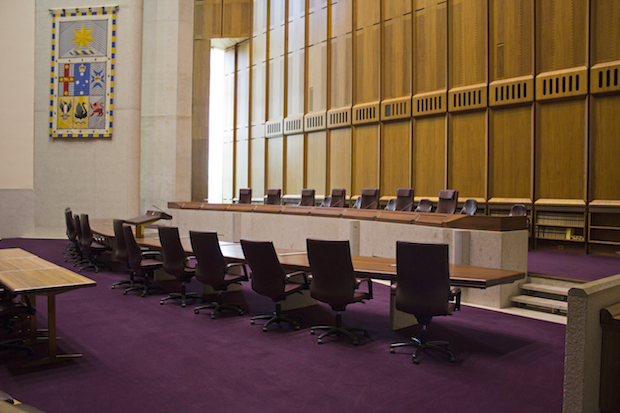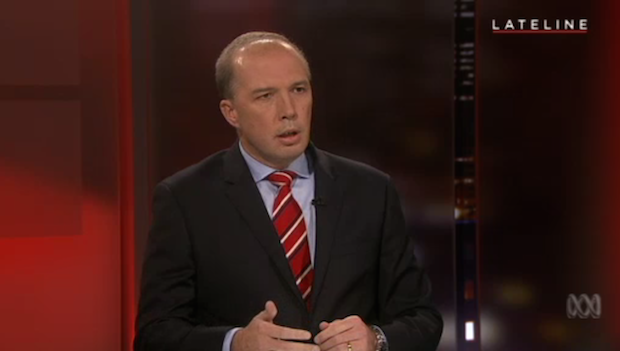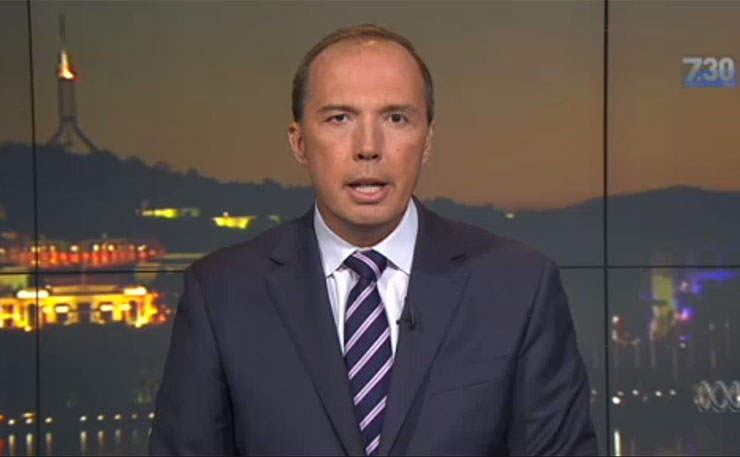For a policy area usually marked by silence, it’s been one hell of a noisy week.
Minister for Immigration Peter Dutton hit the media, daring to venture twice onto the ABC, an outlet he usually only gives comment to by accident.
The Nauruan government had something to say too: it declared detention had ended on the island.
Meanwhile, in response to months of reports of violence against refugees and (yet more) new and alarming allegations of sexual assaults, the government sent this reassuring tweet.
Despite unfounded media reports, refugees live safely in Nauru. This man just received his driver’s licence #auspol pic.twitter.com/GGGlsEjb30
— Republic of Nauru (@Republic_Nauru) October 7, 2015
As glad as we are refugees in the community on Nauru aren’t being prohibited from obtaining licences, a coupe of other small questions remain to be answered about the events of this week.
1) Is Detention Over?
Despite the statement issued by the Nauruan government, no.
The reason we can answer that so unequivocally is that there are still over 900 people detained on Manus Island, and just over 2,000 in Australia.
But even the situation on Nauru remains complicated.
As noted, the Nauruan government announced the Australian backed detention centre on the island will now be an “open centre” 24-hours a day. That doesn’t mean the detention centre is closing down, or that people will be immediately moved out of it, but they will now be free to move from it 24-hours a day, according to Nauruan authorities.
2) Is That A Good Thing For Refugees?
Kind of. The Nauruan government has also said the 600 or so people still in detention will have their refugee determinations handed down this week.
Getting people out of the so-called Regional Processing Centre on Nauru is certainly for the best. It has already been allowed to house too many horrors and we know – as does the Australian government – that prologued detention does devastating things to people’s mental health and the growth and development of children.
But the really troubling thing is the increasing reports of sexual violence in the community, unlikely to be properly investigated because of Nauru’s under-resourced and politicised judicial system.
Australia has committed police assistance and Nauru is being pushed to provide better child protection and anti-sexual violence services.
How the influx of 600 people to an island of just 10,000 will impact community relations is a big unknown.
Refugee lawyers are also worried that the rapid processing of the remaining applications could result in people with well-founded fears of persecution having their claims turned down and facing a return to danger. Nauruan officials have already conceded things are not going to progress as initially promised.
We’ll come back to this, but it needs to be remembered that refugees will not be resettled on Nauru in the long-term. Their release into the community, should it come to fruition, is only a small step towards real freedom and a new life, a road many of the people imprisoned on Nauru have been walking for years now.
3) Was The Opening Of The Nauruan Centre Designed To Undermine A Legal Challenge To Offshore Detention?

Peter Dutton has rejected the claim Australia pressured Nauru to make the change for the above reason. All other available facts point to a different conclusion.
The case in question is a constitutional challenge to offshore detention being run by the Human Rights Law Centre on behalf of a woman who had been detained on Nauru but was temporarily transferred back to Australia.
The government is clearly concerned about the case, and rushed legislation through parliament in June – with the help of the ‘Opposition’ – to try to head one off one element of the challenge.
No sooner had Nauru announced the changes to detention, government lawyers were using them to bolster their case when hearings got underway yesterday.
A leaked immigration document snapped up by Crikey shows the Australian government knew about the changes before they were introduced to the Nauruan Parliament, and had planned to use the fact in its case.
While Nauru has been an ‘open’ centre for some time, and the Australian government argues the 24/7 open arrangement was being worked towards already, the sudden announcement that 600 refugees will be processed virtually at once is particularly suspicious. When Dutton was pressed on how Nauru could process 600 people in a week when it had managed only around two thirds of that number in the proceeding three years, he was vague in the extreme.
This is either an incredible piece of good fortune for the government or a lie on the part of Dutton.
4) Advocates Are To Blame For Decisions By Cambodian Leaders
In the two interviews on the ABC, Dutton used a number of lines which could have easily been copy-pasted from one transcript to the other, or from any of the interviews he, Abbott, and Morrison have given on refugees over the past few years. It’s still people smugglers, stopping boats, and deaths at sea.
Another favourite, blaming problems on ‘refugee advocates’ (whoever they are), also resurfaced.
Pressed first by Emma Alberici then Fran Kelly on why just four refugees have been resettled in Cambodia so far, Dutton said advocates in Australia had been encouraging refugees not to take a settlement option there.
The claim ignores an obvious fact: despite spending around $55 million to convince the Cambodian government to take people off Nauru’s hands, and by extension Australia’s, Dutton and Morrison’s plan to move people there has been halted by the Cambodian government.
Refugees probably don’t want to go to Cambodia and for good reasons – the nation is underdeveloped and has a history of returning refugees directly to harm. But the irony of Dutton’s line of attack is that it is currently the Cambodian government, not refugees or their allies, who are stopping more settlements occurring.

5) There’s Still No Pacific Solution
One new piece of information we did have extracted from Dutton this week is that Australia is shopping around other Pacific nations to take refugees. As mentioned, those on Nauru don’t look set to go to Cambodia any time soon, and are only supposed to be on the island for five to 10 years.
Meanwhile, not a single person has been settled in Papua New Guinea, the other plank of the plan. As Human Rights Watch’s Elaine noted after a recent visit to Manus Island, more people have died in the centre than been resettled.
The ‘solution’ set up by Labor under Julia Gillard, sharpened by Kevin Rudd, and carried to its brutal conclusion by Tony Abbott, has not worked. Around 2,000 people are still stuck in limbo on two pacific islands as a result.
So who will be next? Vanuatu? Tuvalu? The Federated States of Micronesia? Dutton was tight lipped, so we’ll have to wait and see.
6) Bill Shorten Did A Very Small Thing Right
The Leader of the Opposition wants Turnbull to bring the woman allegedly raped on Nauru to Australia so she can have an abortion here. It’s illegal on Nauru.
Needless to say, he still supports the policy that leaves all the women at risk on Nauru there, and the return of those who come to Australia for temporary medical help.
The fact some arch-conservatives have called for the woman in question to be helped by Australia perhaps puts Shorten’s calls into context.
The vine of conservative host @PMOnAir on the pregnant refugee who wants an abortion http://t.co/sp3SjFogZg https://t.co/bF9je87iuY
— Mark Di Stefano (@MarkDiStef) October 8, 2015
7) The End Of Boats Has Not Meant The End Of The Debate
Boats are no longer making it to Australia, but as the above should make clear there are scores of unanswered questions about Australia’s current policy settings. In the week of a major High Court challenge that also saw 11 young activists arrested for occupying a Department of Immigration office it should be remembered that there is still resistance to both the broader policy goals and the details of Australia’s harsh treatment of refugees.
At Labor’s national conference a key argument put by supporters of boat turn-backs was that accepting the policy would depoliticise the refugee issue. They appear to have been mistaken.
Donate To New Matilda
New Matilda is a small, independent media outlet. We survive through reader contributions, and never losing a lawsuit. If you got something from this article, giving something back helps us to continue speaking truth to power. Every little bit counts.




